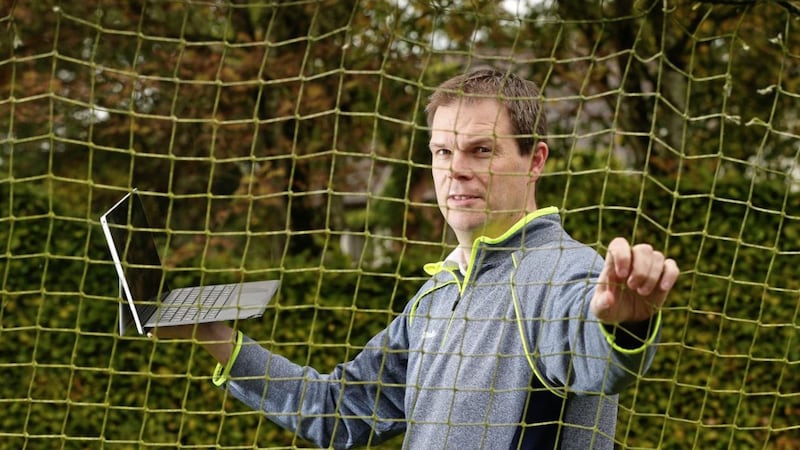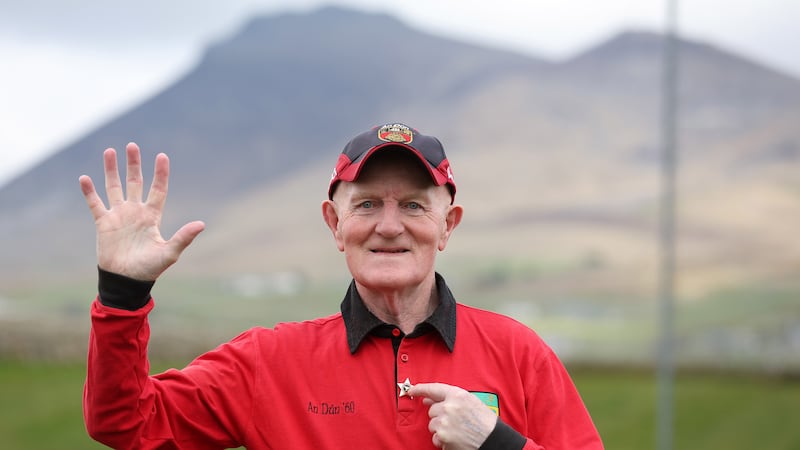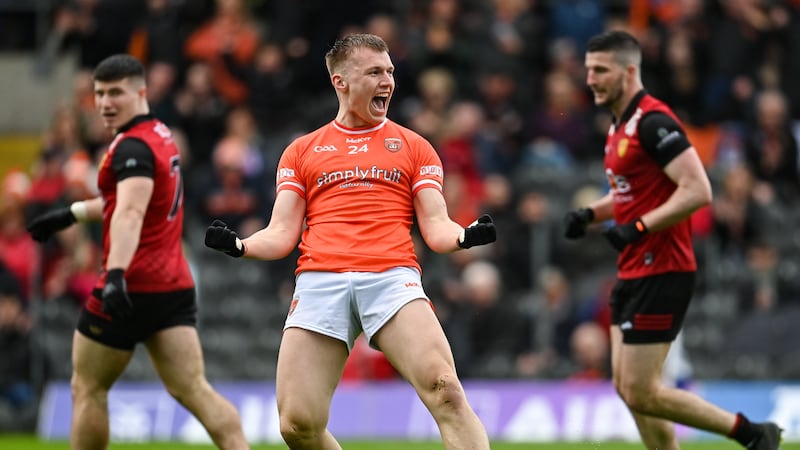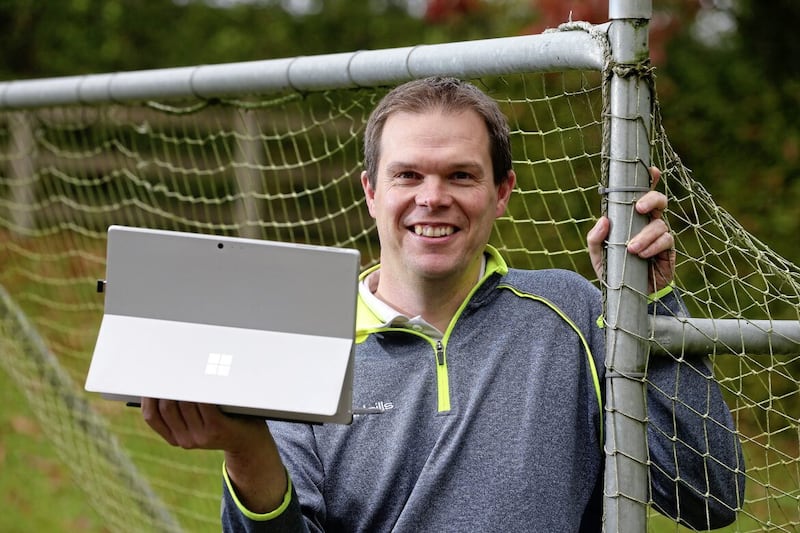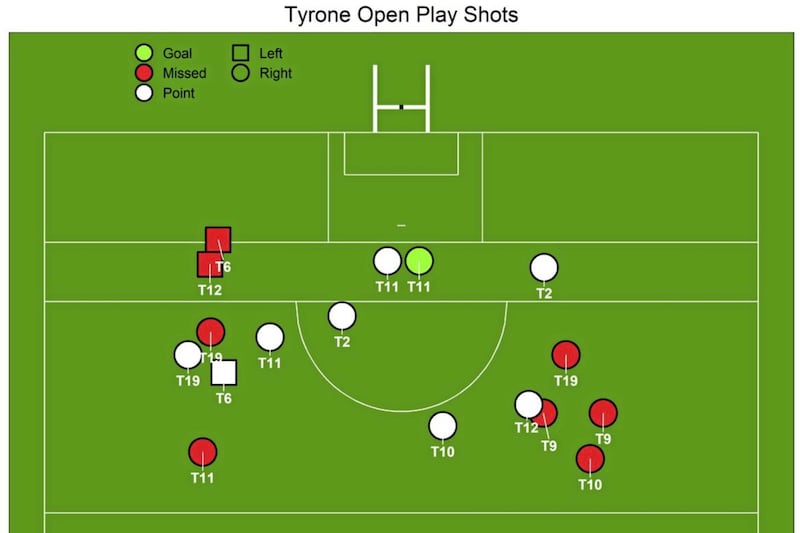ULSTERMEN have exerted considerable influence on Liverpool Football Club. From its founder, Monaghan-born 'Honest' John McKenna, to recent manager Brendan Rodgers, up to current chief scout Barry Hunter.
Yet the input of Tullysaran man Colin Trainor has largely gone unregarded, although not completely unnoticed by those with an eye for detail.
Without an online article by Trainor, Jurgen Klopp might not be at Anfield, and the Reds might not have won the Champions League last year and the Premier League this year.
Trainor makes no such claims about himself, yet the only person who gets more mentions in the index of German soccer writer Christoph Biermann's excellent book 'Football Hackers' - subtitled 'The Science and Art of a Data Revolution' - is 'Kloppo' himself.
A finance director by profession, Trainor's hobby was analysing soccer data. At the end of 2014, Borussia Dortmund, who had been Champions League finalists 19 months earlier, were almost bottom of the Bundesliga. Indeed, had they conceded one more goal before the winter break they would have been last.
This puzzled Trainor.
'The use of analytics can help us begin to make assessments about whether certain results have arisen from great skill or were possibly due to some combination of 'fortuitous circumstances'," he wrote on his blog.
Or, in the case of Dortmund, 'unfortunate circumstances'.
Trainor's expected goals model (xG) calculated that Dortmund 'should' have scored seven more goals and conceded nine less, which would have doubled their points tally to 30 – and placed them fourth.
All done not by watching their matches but 'simply' by studying the data.
StatsBomb
His December 29 2014 article on the StatsBomb.com website was widely read by the soccer analytics community – including by Ian Graham.
Liverpool FC's Head of Research, Graham looked at Dortmund in the spring of 2015, ran his own xG model, and agreed with Trainor's conclusions – neither Klopp nor Dortmund had suddenly become bad, in fact they remained the second best team in Germany.
Trainor laughs when asked if he even supported a soccer team: "OK, I used to, I actually used to support Manchester United. Because I was primarily a gambler I was betting against Manchester United most weeks because they were over-valued because of their name, they were too short; I was constantly backing the underdog, getting half a goal to a goal-and-a-half.
"So my support waned, and when you get into analytics you really leave your emotion at the door. For the last while, I wouldn't say I support a soccer team now."
Indeed although he worked with a Premier League club during the 2015/16 season, his scrutiny has turned to Gaelic football.
"I had stopped doing soccer for three or four years. Working for that Premier League club I 'went dark', I wasn't Tweeting, everything was done for them, I didn't publish anything.
"Also, my technical skills ran out, as regards matching tracking data files, geometrical calculations and so on. Gaelic has always been the sport I've enjoyed most."
43 and 11/12ths
You know you're dealing with a precise yet humorous and unusual mind when he tells you that's his age.
"I always liked numbers. At primary school I wanted to be a bank manager because I thought they earned about £100 a week at the time; when I was nine or 10 I thought that was big money.
"I always had a flair for numbers. I'm contrary, I like challenges. I did Maths and Accountancy at 'A' Level and did a degree in Accountancy at Queen's.
"I played Gaelic football up until Minor – and then I went up to Belfast and that was the end of that. I've always been a big sports fan.
"My graduation ceremony was the day David Beckham got sent off against Argentina [at the 1998 World Cup] so we were in the Students' Union dancing on tables because England got beat."
Having trained as a chartered accountant and now a finance director for EY (Ernst Young as was), one of the largest global accountancy/ professional services firms, he has "an analytical mindset. That's how I view things, try to analyse things, make decisions. You're trying to cut through bullshit.
"In my daily work you have people telling you everything is good and this thing is working and you're thinking '….Nah, hang on, there's something not quite right here. If you're saying that then why is this thing over here showing a red flashing light?' I try to boil things down to what's important."
Graphic detail
If a picture is proverbially worth a thousand words Trainor believes a graphic can convey as much information as a match report. His latest idea is the 'Possession timeline' in GAA.
"People are used to looking at pie charts or bar graphs and you know when an area is full or not full or doesn't have a lot of data on it, that tells you something.
"The mind can interpret a lot more from a picture. The key is working out how to visualise that to get the message across to people.
"Where I'm at is 'the story of the game': Why did things happen? Where did teams not do well? Where can we improve? Especially for opposition analysis, where does that team attack, or where are they weak?
When we spoke, he'd spent the previous Sunday watching the Derry, Galway, and Meath SFC Finals, all on various screens.
"It's one of the great things about 2020: although it's been pretty shit, the amount of games we now have to stream through different services is great.
As with the clichéd team winter training in 'muck and nettles', Trainor had put in the hard yards pre-match(es):
"It's impossible to log every pass live but I can log what I call 'major events': changes of possession, shots, fouls, goal-kicks, when a team picks up possession."
Passing the time
It wasn't just those three finals, though. On that Sunday morning he looked at the Cavan SFC Final replay:
"I had a hankering to log every pass and it was really interesting: Kingscourt had a very possession-heavy game, went back and across, whereas Crosserlough, the winners, played very direct. Not only that, Kingscourt totally avoided their left side of the pitch in the first half – which you just didn't appreciate watching the game.
"That's where this becomes helpful. For a coach it's almost impossible to recall where you attacked or didn't attack.
"But it was clear as day with Kingscourt and in the second half, because they were trailing, they totally changed and went long and direct. They played long balls into the 'D', but every single one was intercepted as Crosserlough put a big midfielders back onto the '21'. We all know that teams' tactics change but that came out so well.
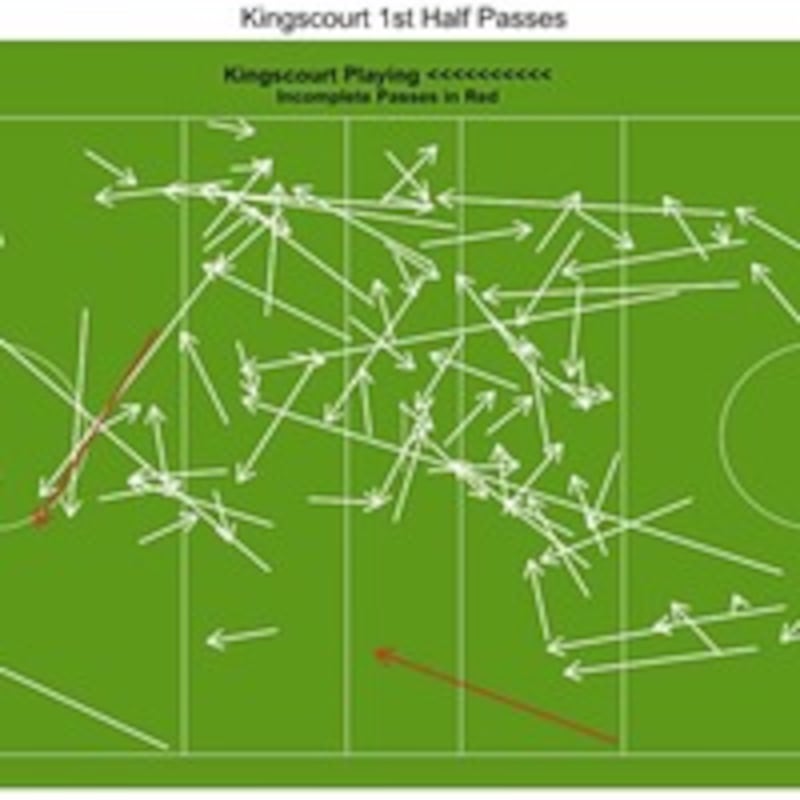
"That took me about two-and-a-half hours, but after that you can do so much once you've every pass in the game plotted."
Although, unfortunately, the GAA is far away from that level of data availability, he has almost three decades of data-gathering behind him.
"It started off whenever I was far too young, backing horses. I remember when I was around 14 creating a program on an Amstrad PC which ran a visual basic, inputted the form and it spat out what it thought the winner was going to be. Just absolute nonsense because it had no idea how much weight the horse had, whether it had won course or distance, but I was trying to do something different.
"I've always been fascinated by predicting things. The reason I got into it all was gambling – I've been a fairly serious sports better, primarily football [soccer]. From about 2005 I collected a lot of soccer data from scraping websites, from the likes of 'Squawka' and 'Who Scored?'
"Now everyone has data from Opta [the worldwide sports performance data provider] but back then ESPN carried match reports, so I worked out how to store numbers of bookings, shots, corners, and so on. I was doing that for years, building predictive models, trying to win bets by being more accurate than the market. I was pretty successful for a while.
'The best pub in the world'
"Around 2011 I discovered Twitter - he's @colintrainor - and found the football analytics 'corner', people who talked about that sort of stuff.
"People told me 'Twitter's nonsense' and I said 'Would you stop?! Twitter is like the best pub in the world, it's an infinite-sized pub, you find your wee corner and plop down with people who you want to chat to. There's a load of nonsense going on in the background but you just ignore it'.
"Twitter gives you a platform and you can speak to people directly; you can DM [direct message] footballers, journalists, and build up networks.
"Twitter is a massive reason why stuff has happened, it just becomes much more accessible. I found I had more data than football clubs had.
"I created shot maps on Excel around 2012/13 and they look hideous now but they weren't there before. People didn't know where teams were shooting from, which seems so crazy nowadays."
He also developed the concept of Passes Per Defensive Action (PPDA), basically rating the intensity of the defending against an attacking side, starting from the attackers' goal – pressing, to put it more simply.
"Marseilles contacted Opta, thought it was their metric, I know a lot of top teams still use PPDA as their pressing metric.
"I created that…I don't know if you could patent it. People can copy it but they can't take away your ideas."
Premier League
He could monetise his thinking, and did for a time. Journalist Gabriel Marcotti "thought why don't football people speak to these analysts? Clubs are buying players on the recommendation of agents, who are getting involved in the deal, so the whole thing is backwards.
"Gab introduced me to people within football and I managed one club's whole data for a season. They were getting the files from Opta but nothing was really being done with them. I was able to parse the information, do opposition analysis, advising on transfers.
"You pay a few small quid for someone like me to make recommendations and you can make or save millions in the transfer market.
"I was still working full-time. Even now, every spare hour I have, it's my hobby, my downtime from work. Instead of putting on the TV and watching Netflix generally most times that's what I'd be doing.
"Everything I do, I think 'Why do I do this?', he laughs. "I kind of want to make a difference.
"When I consulted for that Premier League team in 2015/16 I urged them to buy Naby Keita in January 2016, and again in April, when he was at Salzburg, relatively unknown. Unfortunately that fell on deaf ears. His price was £10-12 million at that time."
Keita eventually moved elsewhere, to Anfield, for more than £50m, but Trainor is still in awe of the analytics approach there:
"Liverpool are just hitting it out of the park, they are amazing. I remember when Brendan Rodgers threw Michael Edwards under the bus, who was this computer geek getting paid 300 grand?"
Then the technical director, Edwards has been LFC's Sporting Director since November 2016 and Trainor says: "What he has done, and how Liverpool have seamlessly integrated that approach, is just amazing.
"I would have been a United fan, but when you think of the money they have wasted on stupid signings, even [Manchester] City as well, they haven't been as smart as Liverpool."
GAA lacking data
He'd love GAA to do more with data too. "What we're really missing in Gaelic football is an Opta. I'd heard talk of that happening, but 2020 has probably put paid to that due to finances.
"I'm pretty much re-inventing the wheel, having to spend so much time collecting data.
"In soccer, I was starting with all the data collected, a database of 1.6million shots. Gaelic football is so far behind for obvious commercial reasons. Any county analyst has to do the same.
"I'm not even doing analytics in Gaelic football, it's more about collecting the events and displaying them.
"The next level would be building a database and from there understanding passes made from one area of the pitch to another and how successful they are. But we're so far away from that.
"There are years of data to accumulate in order to build up expected completion data for passing so as to analyse players fairly – where they started, where they ended, distance travelled, how many times has this type of pass appeared. I'd like to get to that but the amount of work involved would be mammoth."
Playing his part
For how he's enjoying liaising with clubs who reach out to him and, so far, has found the GAA community receptive to his thinking:
"I haven't had any negative comments at all, which is a change from the soccer.
"The odd time someone from the other side of 'the pub' [Twitter] would have strayed across and I was told 'You're a virgin, you live in your mother's basement' – bear in mind I was a 40-year-old married man with three kids. I haven't had any of that nonsense yet.
"It's probably very niche – not in Ireland but in Twitter terms, so there won't be many prepared to think about it yet."
Trainor, though, makes a strong case for analysing match data: "There isn't a club team that doesn't do strength & conditioning, because it helps them. So why would you not look at this area? Managers might need to be convinced about the usefulness of this information."
"Why would anybody not want all the information available to them? And then decide what to use and what not to use? I can't fathom why anyone would be so closed as to say 'No, I don't even want to take that on board'.
"Why in any business would any executive not want as much info as possible and then decide what was the right information to choose?"
Keeping within boundaries
Yet he balks at the suggestion he could offer tactical advice: "You need to be careful, that's very dangerous. Coaches coach, managers pick teams.
"Say I thought a club could get a player for £5m and he should cost £20m but the manager hasn't bought in – in an imaginary world I get my way and the owner steps in and buys the player over the manager's head. He's not going to get any minutes because the manager didn't want him in the first place.
"We definitely don't overstep our mark. You can give all the information but if the coach or manager doesn't think it's suited to them then that's the end of it. I'd like to think the best coaches and managers will be open-minded.
"With Gaelic, I'd be careful – it presents a story of what happened, and I truly believe it can help understand maybe why teams lost games, where they fell out of it, what they were doing wrong. I'd certainly pinpoint an area where the team should be doing better. But you give that to the coach and it's up to him on the Tuesday night to work out what to do.
"They're two very distinct roles – but it's like Liverpool, where Michael Edwards is working really well there now. The culture of the club has changed."
His interest is not financial: "I've a very busy full-time job. It's a hobby, it's down-time, but I want to see if I can make a difference.
"In 40 years' time I'd like to be talking to my grandchildren and, although I didn't appear in any pictures, you'll know you helped a team to win a Championship or achieve more than they should have done by contributing in the background. That would be my reward.”
